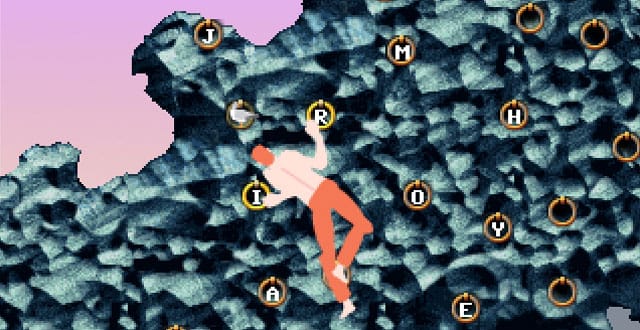Review: GIRP

I’m not an athletic person. Not big, mind you; just out of shape. I’ll go for a run now and then. I’ll order salad over soup every once in awhile. But for the most part, I follow a pretty stereotypical gamer lifestyle.
When I found myself struggling to make my way up an unsteady, muddy mountainside somewhere in rural Quebec—regretting my stupid decision to join a wilderness survival class for college credits—my overexerted legs were a bitter reminder of just how helplessly doughy I really am.
Bennett Foddy’s GIRP takes me back to that moment. The Flash game—from the same Oxford biosciences professor who brought us QWOP—stars an absurdly lanky, muscled rock climber. His back always turned, the long side of his ginger mullet always facing me, he must scale the craggy façade of a seaside rock wall. I begin with him standing on a yellow ladder, the sea at his feet. He is ready to conquer adversity.
GIRP, in all its digital glory, has reminded me of that human potential that exists even in the greatest of couch vegetables.
As the tide slowly rises, I have him climb higher and higher by gripping onto rings, each one marked with a letter. I press “Control” or “Shift” to help him flex his freakishly misshaped muscles. The more I flex, the more I can narrowly reach new rings, climbing higher and higher. Just for the sake of topping my previous height. Just to push myself further.
My fingers twist as I awkwardly switch between letters on my keyboard. I’m using both hands now, crisscrossing them hopelessly. I stretch my pinkie over to the leftmost “Control” button while I rest my thumb and index finger on “R” and “N,” respectively. I make my faceless friend swing, flip, and flop until he reaches the next ring. I can just barely make it … if … I … can … just …. DAMN THAT BIRD.
I can’t get to the next ring. That grey bird is sitting on it—and the next-closest ring is just out of reach. I lose my footing on that mountainside in Quebec. My fingers slip. The water rises. My nimble avatar plunges stupidly to his demise. I can barely feel my legs, while my classmates trek on without me. I hear an angry dog barking in the distance. Everything the rock climber needs to succeed is on my keyboard, no upgrades necessary—but it’s up to me to master it. But as I desperately scramble away from what I begin to suspect is certain death—I am sorely aware of how untrained I am.
That bird is mocking me, flapping from ring to ring. That redheaded avatar is mocking me, so enthusiastic to climb, so foolish when he falls. GIRP is making fun of me. It revels in what I lack as a player. It challenges me that I don’t have what it takes.
But that’s exactly why I keep on trying. GIRP logs my previous best in meters; I strive to outdo myself. When I don’t—I try again. When I do, I bask in the feeling of accomplishment—and still I try again. I pushed myself, despite mud and sweat and pain, to continue up that mountain. I put my doubts aside and actualized some untapped, primal potential. I aimed not just to survive, but to thrive, to pass some of my classmates. To—at least—not reach the campsite last.
GIRP, in all its digital glory, has reminded me of that human potential that exists even in the greatest of couch vegetables. I overcame that height. I got to that campsite. I was dirty, stinky, and my legs hurt.
I scale the mountainside, the rocky seaside face that is my keyboard. My fingers hurt. But I did it.



